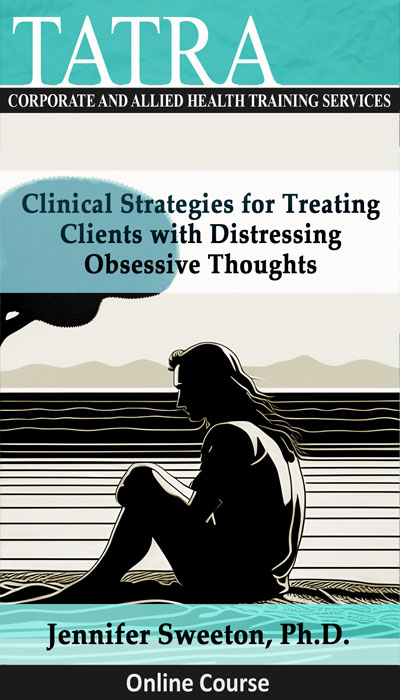06 Apr Clinical Strategies for Treating Clients with Distressing Obsessive Thoughts

‘What if I just stabbed my spouse?’ ‘What if I purposely hurt my baby?’ ‘What if that pain in my stomach is actually cancer?’
Dr. Jennifer Sweeton’s 2.5-hour online course, “Clinical Strategies for Treating Clients with Distressing Obsessive Thoughts,” is designed to provide mental health professionals with practical strategies for helping clients who experience obsessive negative intrusive thoughts.
You will gain an in-depth understanding of the different types of obsessions and how they can manifest in clients. Dr. Sweeton will provide case examples and practical tools to help attendees recognize the signs of distressing obsessive thoughts in their clients.
The course will cover evidence-based treatment strategies for working with clients who experience obsessive thoughts, including exposure and response prevention (ERP) techniques, cognitive restructuring, and mindfulness-based interventions.
This course is ideal for mental health professionals who work with clients experiencing obsessive thoughts, including psychologists, social workers, and counsellors.



This online training program will give you instant access to video content, accessible via streaming on our website. You can view the course content in your own time, there is no time limit on access.
The duration of this course is 2.5 learning hours.
Please click the “Mark Complete” button on each module as you progress through the course. A certificate of completion will be generated upon finishing the course and completing a multiple-choice evaluation quiz (16 questions). Please consult your professional organisation/association to confirm whether you are able to claim any CPD points/hours for this online training program.



 Dr. Jennifer Sweeton is a clinical psychologist, best-selling author, and internationally-recognized expert on anxiety and trauma, and the neuroscience of mental health. She completed her doctoral training at the Stanford University School of Medicine, the Pacific Graduate School of Psychology (now Palo Alto University), and the National Center for PTSD. Additionally, she holds a master’s degree in affective neuroscience from Stanford University, and studied behavioral genetics at Harvard University.
Dr. Jennifer Sweeton is a clinical psychologist, best-selling author, and internationally-recognized expert on anxiety and trauma, and the neuroscience of mental health. She completed her doctoral training at the Stanford University School of Medicine, the Pacific Graduate School of Psychology (now Palo Alto University), and the National Center for PTSD. Additionally, she holds a master’s degree in affective neuroscience from Stanford University, and studied behavioral genetics at Harvard University.